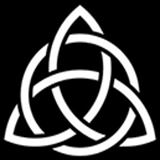Singularity
The Year of Covid
30 03 21 13:53 Filed in: Other
Where were you when the world changed?
As we begin work on this new post, the first one since February, babies conceived during this plague year are being born. Their normal is a Covid normal. Masked faces, elbow bumps and social distancing have replaced hugs and smiles. They will not be expected to “soldier on” through their cold symptoms. Every one of their days has its “epidemiology”, spelled out in graphs and statistics.
Norman Swan, Medical Science journalist, elevated by the pandemic to superstar status, calls this period, as the world begins the slow process of mass immunisation, “the end of the beginning”. We watch with well worn trepidation. And as we do, it feels like an important time to remember the details, to look back at the milestones, to explore the changes.
THE BEGINNING
JANUARY 25 - MARCH 12
January 25 - First Australian case, Wuhan returnee
January 31 - Chinese returnees have to quarantine in a third country
February 11 - WHO names the novel coronavirus and its disease
February 27 - Travellers from China, Iran and Italy banned
March 2 - First Australian community transmission
March 8 - First Australian death
March 9 - Carey Grammar school closed - staff case
March 12 -WHO calls it a pandemic for the first time, Prime Minister announces first economic stimulus package. Australia has had 142 cases so far.
MARGARET'S STORY
January 2020 had begun for me in hospital, five days after my mastectomy. The East coast of Australia was on fire, and Thurra River camp was already gone by then. But for a cautious decision to cancel their booking, the family would have been evacuated from there, just before it burnt.
Just as my cool hospital room, with its expansive views, insulated me from the smoky, hot air outside, so my personal health crisis kept me from the full force of the terrible losses in Gippsland and New South Wales.
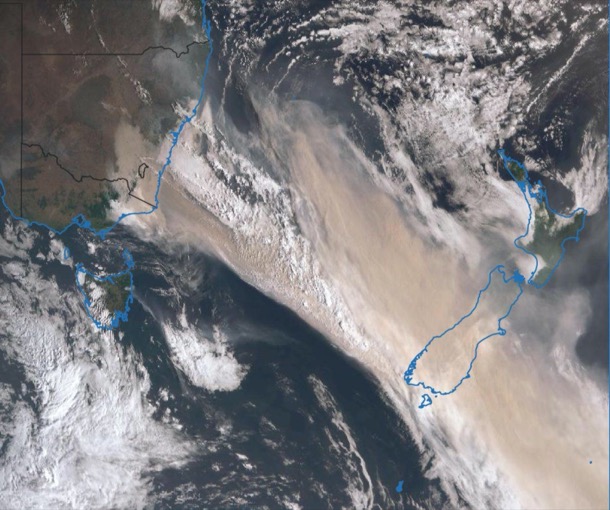
Smoke stretching to New Zealand
I planned to recover over January and be back into my busy life from the beginning of February. I would need a second operation, and had already begun to speculate on the least disruptive way to fit that into the months ahead.
News of a new virus from China was overshadowed by the antics of Trump and the horror of the fires. We heard from our friend Paul, the Point Hicks lighthouse keeper. He sent pictures from an unfamiliar burnt Thurra campground, and stories of sheltering in the lighthouse as the front approached. The first Australian Covid cases on January 25th hardly even caused a ripple in my world.
As February arrived, I felt my grand recovery plan was pretty much on track. I attended the first choir rehearsal, and Sue and I finalised the Recollections post we had begun in December. I was a little more tired than I had anticipated and I put off going back to singing lessons and to yoga. On February 7th I had a haircut. I had no way of knowing that it would be nine months before the next one.
Gradually, as the weeks passed and Autumn soothed the harshness of the Summer, my energy returned, and I began building back more fully. The first worrying Covid signs appeared: on March 2, there was the first Community transmission, and the first Victorian death on March 8. Nevertheless, I began Yoga classes, becoming more used to the lopsided feeling of a prosthetic left breast. The choir’s preparation for our Mikado season hotted up, and I spent lots of time matching costumes to singers, and practising my own part. Now those costumes are folded in boxes under my bed, as we tentatively plan a re-run in 2021.
The last regular engagement in my busy calendar was my weekly singing lesson. I made the arrangement to begin again on Tuesday March 10th, the day after the long weekend. On the Thursday we were all set to go to Bodhi’s twelfth birthday party.
That Tuesday, the WHO finally called it a pandemic and Dan Andrews, with Victorian cases at 36, set the first restrictions. Bodhi’s party was off, Singing lessons and Tuesday’s with Sue ended, and 2020 stretched ahead as a very different year.
THE BEGINNING - SUE'S STORY
By the time Margaret and I returned to our Tuesday routine in 2020 we had lived through a summer dominated by fire, grief, surgery and escalating concern about a virus in China.
In the weeks before Christmas, fires had ravaged much of NSW. Jono’s cousin Robert lost his house in the Blue Mountains and Sydney was covered in a pall of smoke, as mega blazes with towering flames devoured hectare after hectare of bush, destroying thousands and thousands of animals and hundreds of homes. We looked in horror at images of people huddled on beaches, as flames destroyed their town and firefighters were rendered powerless. Against this backdrop, in the week before Christmas, we were packing to go to Thurra. We began to have doubts: it was too dangerous. The bush was tinder dry after two years of drought in East Gippsland and the weather forecast was for hot, windy weather. After much deliberation and a family meeting at Thomas’, we collectively made the decision not to go! The kids were very disappointed, but to their credit, rallied, and began to plan what they could do instead. A week later, on January 31st, the Mallacoota fire roared through Croajingalong National Park, burning much of the park. Familiar places changed forever. Wingan Inlet, the Mueller Valley, the Thurra bridge and campground all gone.
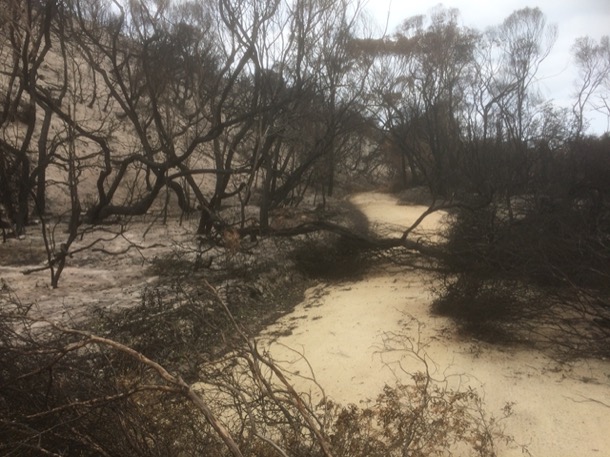
Thurra River Campground after the fire
January, and the fires were still raging as a creeping concern about the spread of a novel coronavirus in Wuhan appeared in news commentary; (COVID-19) the disease, caused by "severe acute respiratory syndrome coronavirus 2". These words were to become very familiar. On the January the 25th, we had a confirmed case of coronavirus in Melbourne, a returned Chinese citizen from Wuhan. This was the first case in Australia.
Three days later Anna was flying back from India via Singapore. We were very concerned that travellers from China would also be transiting through that transport hub. This is the first time I recall being concerned that the virus could infect a family member, or even someone I knew.
February, and Anna was back safely , the kids returned to school and the fire season continued, as the weather was hot and dry. Overseas, the news was alarming: news reports about escalating cases in China, Italy, Iran and on cruise ships. We began to learn more about how the virus spreads and how contagious it was. We closed our border to some foreign nationals, docking by cruise ships was restricted, and our neighbours cancelled their trip to India.
March, and Bodhi’s birthday on the 12th was cancelled! The consensus was: too many people and too risky in a small space. Jono and I went, vowing to socially distance. Unfamiliar with a behaviour that was to become second nature , we did not socially distance. That night, after discussion, we all decided that from now on birthday celebrations would need to at a safe distance and not inside. Little did we know that in 2020, Sara’s birthday in November, would be the only in-person celebration.
THE FIRST WAVE
MARCH 13 - MAY 11
KEY DATES
March 13 - 36 cases. National Cabinet formed.
March 15 - State of Emergency declared.First restrictions
March 19 - Ruby Princess disperses 2700 passengers around Australia
March 20 - Australia closes borders to non residents
March 22 - School holidays begin a week early. Run on toilet paper
March 30 - All Australian restrictions begin. Four reasons to leave home.
April 10 - Easter at home
April 15 - Home schooling begins
April 16 - Supermarkets introduce “old people’s hour”
April 27 - Massive ramp up in testing
May 5 - outbreak in Cedar Meats Abattoir and meat processing plant.
May 11- Some easing of restrictions
MARGARET'S STORY
During those few days, in that second week of March, there were many signs that things were hotting up, as case numbers reached thirty-six. We had scheduled a choir committee meeting before the next Monday night’s rehearsal, and emails shot round the committee.
By the time the Monday came around, Victoria was in its first day of “State of Emergency”. Only half our singers came. We insisted that everyone wash their hands, and we announced that we had decided to stop rehearsals until after Easter, but we went ahead and sang lustily. We knew nothing of aerosol spread. We had not yet heard about the Seattle choir, who, on March 10th also all washed their hands and sat a little further away from each other. Fifty-two of them were infected and two died.
It took another week before it really began to feel personal. We tut-tutted about the Ruby Princess debacle, though its real impact was yet to become clear. The Australian borders closed to tourists. But these things were just items on the News. The habit of listening to Dan Andrews live in Press Conferences began during this time. I remember sitting in the sun in the late morning, as he announced that school holidays were beginning a week early. My friend Laraine complained on Facebook that she had see people buying huge quantities of toilet rolls. We made jokes about it.

As the numbers of infected people in Australia climbed, the first frissons of alarm began. National Cabinet decided that all of Australia would restrict movement. This was the first time we heard the phrase “four reasons to leave home”, and “essential workers”.
We must have had some knowledge by then of infection rates. I remember waiting until fourteen days after Sage, our grandson, had had his last kinder session before we saw him. We poured over the legal document to see if we were allowed to call our visits “care”. I knitted him a “Bluey jumper”, listening to podcasts, filling in time.
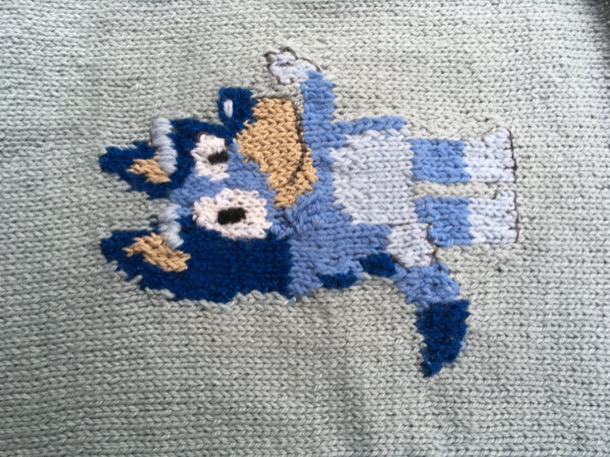
Life became quieter. There were noticeably fewer cars on the roads. Easter came and went. It was the first Easter Sunday for a long time that we had not had lunch with Chris’s parents. We watched Andrea Bocelli sing Panis Angelicus and stroll out to gaze up the empty Milan streets.
Here is the Facebook Post I did on April13th:
As I listened this morning to Andrea Bocelli’s beautiful Easter offering in the empty Duomo in Milan, and watched the footage of empty streets in the world’s great cities, I felt a sense of loss and sadness that I had seen in others, but hadn’t yet felt myself.
The footage reminded me of “The last Time I Saw Paris”, a sad song written by Jerome Kern in 1940. It would be another five years before Paris was liberated.
The camera in Milan roamed over a packed city. All those lives on hold, cooped up little apartments!
In New York, the only sound in the streets is sirens.
But then there is this.....
People in the Punjab, blinking like creatures exiting a cave, look to the north and there, hundreds of kilometres away are the white Himalayas. They have been hidden by pollution for decades.
Factory and vehicle emissions have dropped in China so much that two months worth of pollution reduction “likely has saved the lives of 4,000 kids under 5 and 73,000 adults over 70.”
According to The Climate Group, working from home has the potential to reduce over 300 MILLION tonnes of carbon emissions per year, and surely we will see a lot of that even after the lockdown. And there are stories of animals reclaiming the empty streets all over the world.
I downloaded the Panis Angelicus score in a key that suited me and taught myself to sing it. It became a piece of music I associate with that first Covid wave.
After the school holidays, the kids did not go back. Home schooling began. I was very glad that I was retired. We lived inside our little family bubble, relieving Michael and Katherine of their three year old twice a week. There was a weekly very early morning trip to the shops, first by Chris and then, when Woolworths introduced “old folk’s hour” at 7am, by me. Other than this we stayed home. My three quarters of a tank of petrol lasted until well into May.
Another new word in our vocabulary was Zoom. There were hilarious stories as the world got used to interactions with other people inside little square boxes…. like the man in a “ties and suits” business meeting, who stood up during the meeting, naked from the waist down, and deaf to the cries from his co workers.
During March I joined a couple of international virtual choirs, rehearsing via Zoom, and viewed later on YouTube. I recorded my contributions and sent them in for the engineers to do their magic. It was a way for choristers all over the world to recover something of what they had lost. I set my alarm for 3am to be part of the Self Isolation Choir’s Messiah “concert”. I chatted with fellow choristers on Facebook. But by May, I was losing interest.
My own choir, Singularity, “met” weekly from late April for the whole year. It meant listening only to the piano playing and singing your part by yourself, muted.
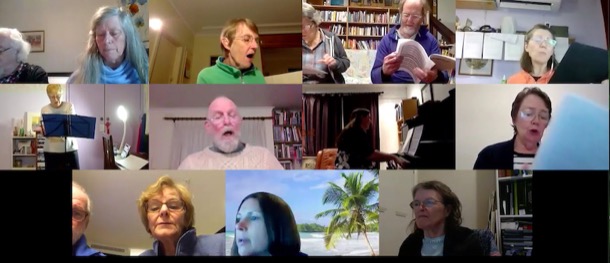
It was a poor imitation of the joy of voices harmonising together, but it was an important way to keep connected. We even held a little “soiree” concert, performing in turn for each other. I sang Panis Angelicus, my Covid anthem, with a YouTube karaoke backing track.
Even as “the numbers” subsided during May, and restrictions eased, singing together in the same room was unthinkable. We had all seen the Science of droplets and aerosols explained. Singing was going to be the last thing to come back. We would have to hang on and wait for a vaccine.
THE FIRST WAVE - SUE'S STORY
March is a jumble of memories and images ranging from the horror of dozens of ambulances lined up in New York streets, refrigerated shipping containers to store the dead outside overflowing hospitals, and the searing beauty of an Italian opera singer performing from her balcony, the aria floating over deserted streets.
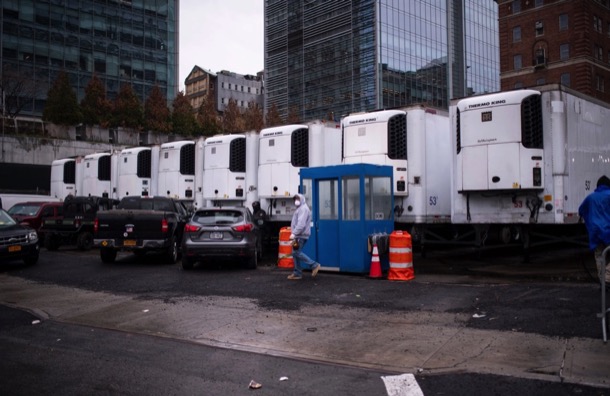
Makeshift morgue outside a New York hospital
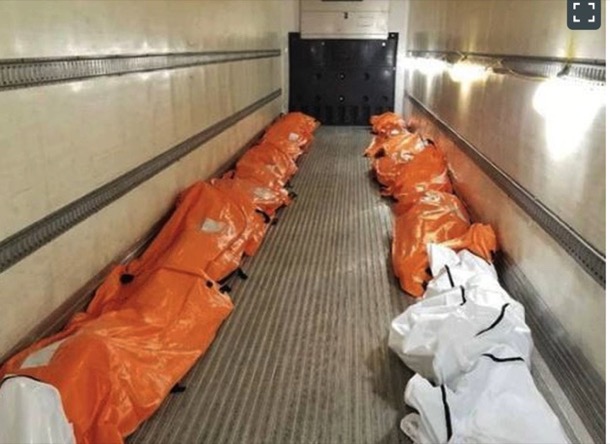
Bodies inside the refrigerator trucks.
The situation in many places overseas was dire but the virus was starting to get a hold in Australia. In this rapidly evolving situation, within the space of six days, a National Cabinet was formed for the first time since the Second World War, the Prime Minister boldly declared that he would still go to his beloved football match and Victoria declared a State of Emergency and limited gatherings. Four days later, the PM decided not to go to the football and instead closed our international borders to non-residents.
The virus was no longer a distant threat. It became personal. We didn’t feel elderly, but we fitted the category. Anna, Thomas, Riz and Tessa were concerned for us and, although quite challenged by the ‘vulnerable’ label, we did see the wisdom of restricting our contact with family and the outside world. Haircuts were cancelled, Poppy and Bodhi sat outside, when they were dropped at our place before school, and we no longer visited each other’s houses. Anna’s birthday, on the 18th of March, was the first remote birthday celebration of many to come.
End of March, and half a million cases globally, and, as cases grew in Australia, restrictions were imposed and life closed in. We felt very lucky to be an island nation and, as Australians, we felt that we were all in this together. All Australians were dealing with only being allowed to leave home for shopping, exercise, work and care giving. In Victoria, schools broke up a week early, and life changed.
Against this backdrop we tried to learn as much as we could about the virus. We faithfully listened to Norman Swann’s Coronacast, a daily podcast about the Coronavirus, and scoured the Internet for more information. In those early days the advice was that the virus was spread by touch. We carefully avoided touching surfaces, not knowing that aerosol spread was our biggest danger. When shopping, a few people wore masks and even gloves. We worried about eating fruit and vegetables that had been touched by other people, and we wiped down the groceries before putting them away. All cleaning materials, disinfectants, bleach, sanitiser and cakes of soap disappeared from supermarket and hardware shelves. Margaret and I both resorted to a bucket in the car boot containing a bottle of water, soap and a towel. I did the shopping, as Jono’s coronary artery disease put him in an extra vulnerable group.
As suburban supermarkets emptied, country supermarkets reported out of town shoppers, in mini buses, descending and stripping their shelves.
We were able to go to Billy Goat Hill, as it was our second residence, and we took a car full of food in case restrictions tightened and we were unable to get home. We also took our rate notice, in case we were challenged shopping in Alexandra, where we felt very conspicuous. Stories were circulating about people from the city shopping and bringing the virus with them. Apparently, very early one morning, the butcher in Yea was offered thousands of dollars cash for his entire stock of meat. He sent the gentleman away empty handed, telling him in no uncertain terms that he had local customers to supply. The panic buying lasted a few weeks and, once supermarket shelves filled up again, the community anxiety subsided.
Restricted in our activities and unable to see the children, grandchildren, family and friends, we began to spend more time at Billy Goat, where we did not even leave the property for shopping.
Lovely autumn days, and we had plenty to do. Days were dominated by hard work, and evenings by the latest Coronacast and the Covid news from Australia and around the world.
Easter, and having our evening drink, we listened to Andrea Bocelli sing to his deserted city. We could play it as loud as we our blue tooth speaker would allow. We sat in isolation, watching the You Tube clip on the iPad, as this accomplished tenor sang to his deserted city.
The rest of April was dominated by cool burning the kangaroo grass and cleaning up after thinning.
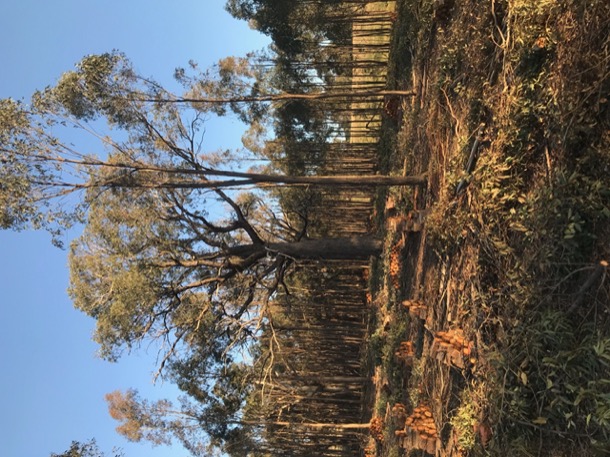
At home the children were coping with home schooling, and parents were supervising where needed. Thomas was still working so Tessa sat Poppy next to her and Bodhi worked on the kitchen bench.
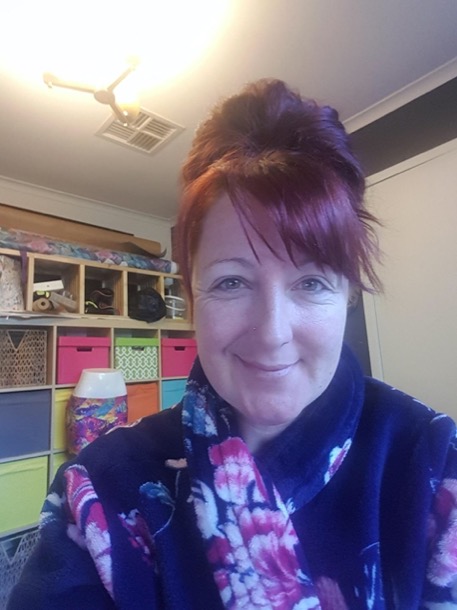
Tessa at the "office" in her dressing gown.
Riz continued to work from home and Anna did online tutoring with her students, while Aiden, Harper and Aurelia worked at their desks. As school work was often efficiently finished by lunchtime, the rest of the day was spent cooking, talking to friends or having ‘watch parties’. Although home schooling suited our grandchildren, it was challenging for some students, particularly the younger ones. I remember Anna telling me that the achievement for one session was having her small student sit on a chair in front of her screen, and not in her wardrobe. Teachers had new disciplinary issues to deal with, such as persuading a Prep student to put his sister down, get back on his chair and turn the microphone on.
Meanwhile, life continued at Billy Goat. Burning and thinning done and the weather now colder and very wet, we started on the erosion work.
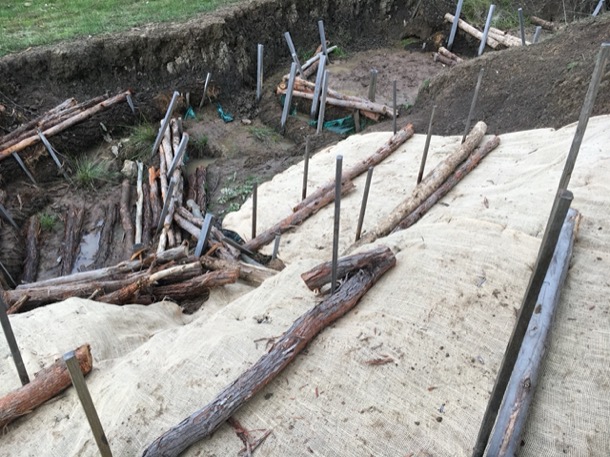
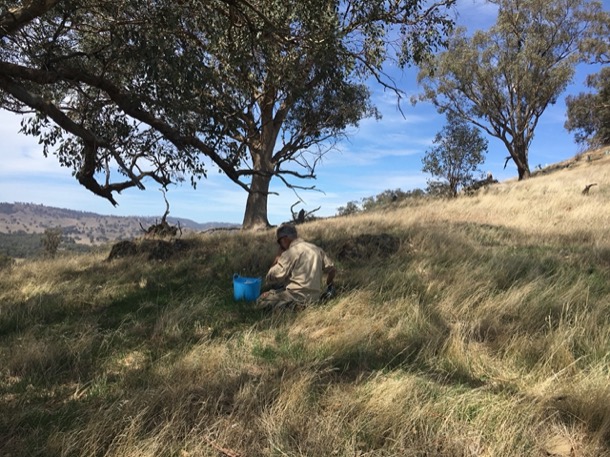
Numbers of daily cases were dropping and some there was some easing of restrictions. We decided however to remain cautious and still continue to restrict our lives and social interactions.
THE LULL
MAY 11 - JUNE 9
KEY DATES
May 11 - Some easing of restrictions
May 26 - phased return to classrooms begins
June 1 - Stage 3 restrictions eased
June 9 - last day of zero cases, numbers going up again
The month of May was a catch up time. We hoped it was a gradual return to normality. For most of May, kids were still doing home schooling, most people were working from home, shops and restaurants were still mostly shut, but there was a sniff of life opening up again.
Sue and Jono, after much deliberation, accepted an invitation to lunch at a friends’s house. Only one of the people present had been “out in the world”, so they decided to accept the risk. No “social distancing” happened of course. They sat around a table talking and laughing for several hours. There were no bad consequences, but it only happened once.
Hairdressers reopened during May, though appointment times were limited. Sue’s hairdresser had stories of cutting customers’ hair in the carpark.
I didn’t have my haircut during this time, but I did go the dentist to have a filling replaced; visited the doctor in Kallista, for drive through flu injections and had my car shock absorbers fixed at the Toyota service centre. Each of these felt like venturing out into the dangerous world. We preplanned, and chose our time carefully.
We had planned to ring Toyota late in the day, and say we couldn’t pick the car up, so that it would sit untouched in the yard overnight, and there would be “less virus” on all its surfaces when we collected it the following day. In the end, I picked it up and consciously only touched what I had to, and we didn’t drive it again for a few days.
Guests, where Sue and Jono had their car serviced, went one better. They wiped down every surface in the cars before their customers collected them.
The World Health Organisation, and our own authorities were still refusing to recognise that this corona virus spread primarily through the air, even though the evidence was mounting.
The other big appointment I had put off was my second breast operation. May seemed like the perfect time. Hospitals were available again, and I knew that I had to have it within a certain number of months. The surgeon agreed that this was “permissible surgery”, and we set the date for May 27th. The staff of Ringwood Private hospital did not wear any special protective equipment. Within that little haven, there might as well have been no pandemic.
A few days after, I had occasion to go to our local Ferntree Gully public hospital, and the contrast was noticeable. Everyone was masked. When asked about the difference, the doctor explained that public hospitals took everyone. They couldn’t screen their patients. So they needed to expect many more infection sources. I was careful to see nobody during the next two weeks.
Towards the end of May, there was even more gentle opening up. Schools returned to face to face teaching, gradually, class by class. Aurelia and Harper began footy training again. Alas, that little taste of normal life lasted only one week! As Autumn ticked over into winter, we watched with trepidation, as what would become Melbourne’s second wave appeared on the horizon.
As we begin work on this new post, the first one since February, babies conceived during this plague year are being born. Their normal is a Covid normal. Masked faces, elbow bumps and social distancing have replaced hugs and smiles. They will not be expected to “soldier on” through their cold symptoms. Every one of their days has its “epidemiology”, spelled out in graphs and statistics.
Norman Swan, Medical Science journalist, elevated by the pandemic to superstar status, calls this period, as the world begins the slow process of mass immunisation, “the end of the beginning”. We watch with well worn trepidation. And as we do, it feels like an important time to remember the details, to look back at the milestones, to explore the changes.
THE BEGINNING
JANUARY 25 - MARCH 12
January 25 - First Australian case, Wuhan returnee
January 31 - Chinese returnees have to quarantine in a third country
February 11 - WHO names the novel coronavirus and its disease
February 27 - Travellers from China, Iran and Italy banned
March 2 - First Australian community transmission
March 8 - First Australian death
March 9 - Carey Grammar school closed - staff case
March 12 -WHO calls it a pandemic for the first time, Prime Minister announces first economic stimulus package. Australia has had 142 cases so far.
MARGARET'S STORY
January 2020 had begun for me in hospital, five days after my mastectomy. The East coast of Australia was on fire, and Thurra River camp was already gone by then. But for a cautious decision to cancel their booking, the family would have been evacuated from there, just before it burnt.
Just as my cool hospital room, with its expansive views, insulated me from the smoky, hot air outside, so my personal health crisis kept me from the full force of the terrible losses in Gippsland and New South Wales.

Smoke stretching to New Zealand
I planned to recover over January and be back into my busy life from the beginning of February. I would need a second operation, and had already begun to speculate on the least disruptive way to fit that into the months ahead.
News of a new virus from China was overshadowed by the antics of Trump and the horror of the fires. We heard from our friend Paul, the Point Hicks lighthouse keeper. He sent pictures from an unfamiliar burnt Thurra campground, and stories of sheltering in the lighthouse as the front approached. The first Australian Covid cases on January 25th hardly even caused a ripple in my world.
As February arrived, I felt my grand recovery plan was pretty much on track. I attended the first choir rehearsal, and Sue and I finalised the Recollections post we had begun in December. I was a little more tired than I had anticipated and I put off going back to singing lessons and to yoga. On February 7th I had a haircut. I had no way of knowing that it would be nine months before the next one.
Gradually, as the weeks passed and Autumn soothed the harshness of the Summer, my energy returned, and I began building back more fully. The first worrying Covid signs appeared: on March 2, there was the first Community transmission, and the first Victorian death on March 8. Nevertheless, I began Yoga classes, becoming more used to the lopsided feeling of a prosthetic left breast. The choir’s preparation for our Mikado season hotted up, and I spent lots of time matching costumes to singers, and practising my own part. Now those costumes are folded in boxes under my bed, as we tentatively plan a re-run in 2021.
The last regular engagement in my busy calendar was my weekly singing lesson. I made the arrangement to begin again on Tuesday March 10th, the day after the long weekend. On the Thursday we were all set to go to Bodhi’s twelfth birthday party.
That Tuesday, the WHO finally called it a pandemic and Dan Andrews, with Victorian cases at 36, set the first restrictions. Bodhi’s party was off, Singing lessons and Tuesday’s with Sue ended, and 2020 stretched ahead as a very different year.
THE BEGINNING - SUE'S STORY
By the time Margaret and I returned to our Tuesday routine in 2020 we had lived through a summer dominated by fire, grief, surgery and escalating concern about a virus in China.
In the weeks before Christmas, fires had ravaged much of NSW. Jono’s cousin Robert lost his house in the Blue Mountains and Sydney was covered in a pall of smoke, as mega blazes with towering flames devoured hectare after hectare of bush, destroying thousands and thousands of animals and hundreds of homes. We looked in horror at images of people huddled on beaches, as flames destroyed their town and firefighters were rendered powerless. Against this backdrop, in the week before Christmas, we were packing to go to Thurra. We began to have doubts: it was too dangerous. The bush was tinder dry after two years of drought in East Gippsland and the weather forecast was for hot, windy weather. After much deliberation and a family meeting at Thomas’, we collectively made the decision not to go! The kids were very disappointed, but to their credit, rallied, and began to plan what they could do instead. A week later, on January 31st, the Mallacoota fire roared through Croajingalong National Park, burning much of the park. Familiar places changed forever. Wingan Inlet, the Mueller Valley, the Thurra bridge and campground all gone.

Thurra River Campground after the fire
January, and the fires were still raging as a creeping concern about the spread of a novel coronavirus in Wuhan appeared in news commentary; (COVID-19) the disease, caused by "severe acute respiratory syndrome coronavirus 2". These words were to become very familiar. On the January the 25th, we had a confirmed case of coronavirus in Melbourne, a returned Chinese citizen from Wuhan. This was the first case in Australia.
Three days later Anna was flying back from India via Singapore. We were very concerned that travellers from China would also be transiting through that transport hub. This is the first time I recall being concerned that the virus could infect a family member, or even someone I knew.
February, and Anna was back safely , the kids returned to school and the fire season continued, as the weather was hot and dry. Overseas, the news was alarming: news reports about escalating cases in China, Italy, Iran and on cruise ships. We began to learn more about how the virus spreads and how contagious it was. We closed our border to some foreign nationals, docking by cruise ships was restricted, and our neighbours cancelled their trip to India.
March, and Bodhi’s birthday on the 12th was cancelled! The consensus was: too many people and too risky in a small space. Jono and I went, vowing to socially distance. Unfamiliar with a behaviour that was to become second nature , we did not socially distance. That night, after discussion, we all decided that from now on birthday celebrations would need to at a safe distance and not inside. Little did we know that in 2020, Sara’s birthday in November, would be the only in-person celebration.
THE FIRST WAVE
MARCH 13 - MAY 11
KEY DATES
March 13 - 36 cases. National Cabinet formed.
March 15 - State of Emergency declared.First restrictions
March 19 - Ruby Princess disperses 2700 passengers around Australia
March 20 - Australia closes borders to non residents
March 22 - School holidays begin a week early. Run on toilet paper
March 30 - All Australian restrictions begin. Four reasons to leave home.
April 10 - Easter at home
April 15 - Home schooling begins
April 16 - Supermarkets introduce “old people’s hour”
April 27 - Massive ramp up in testing
May 5 - outbreak in Cedar Meats Abattoir and meat processing plant.
May 11- Some easing of restrictions
MARGARET'S STORY
During those few days, in that second week of March, there were many signs that things were hotting up, as case numbers reached thirty-six. We had scheduled a choir committee meeting before the next Monday night’s rehearsal, and emails shot round the committee.
By the time the Monday came around, Victoria was in its first day of “State of Emergency”. Only half our singers came. We insisted that everyone wash their hands, and we announced that we had decided to stop rehearsals until after Easter, but we went ahead and sang lustily. We knew nothing of aerosol spread. We had not yet heard about the Seattle choir, who, on March 10th also all washed their hands and sat a little further away from each other. Fifty-two of them were infected and two died.
It took another week before it really began to feel personal. We tut-tutted about the Ruby Princess debacle, though its real impact was yet to become clear. The Australian borders closed to tourists. But these things were just items on the News. The habit of listening to Dan Andrews live in Press Conferences began during this time. I remember sitting in the sun in the late morning, as he announced that school holidays were beginning a week early. My friend Laraine complained on Facebook that she had see people buying huge quantities of toilet rolls. We made jokes about it.

As the numbers of infected people in Australia climbed, the first frissons of alarm began. National Cabinet decided that all of Australia would restrict movement. This was the first time we heard the phrase “four reasons to leave home”, and “essential workers”.
We must have had some knowledge by then of infection rates. I remember waiting until fourteen days after Sage, our grandson, had had his last kinder session before we saw him. We poured over the legal document to see if we were allowed to call our visits “care”. I knitted him a “Bluey jumper”, listening to podcasts, filling in time.

Life became quieter. There were noticeably fewer cars on the roads. Easter came and went. It was the first Easter Sunday for a long time that we had not had lunch with Chris’s parents. We watched Andrea Bocelli sing Panis Angelicus and stroll out to gaze up the empty Milan streets.
Here is the Facebook Post I did on April13th:
As I listened this morning to Andrea Bocelli’s beautiful Easter offering in the empty Duomo in Milan, and watched the footage of empty streets in the world’s great cities, I felt a sense of loss and sadness that I had seen in others, but hadn’t yet felt myself.
The footage reminded me of “The last Time I Saw Paris”, a sad song written by Jerome Kern in 1940. It would be another five years before Paris was liberated.
The camera in Milan roamed over a packed city. All those lives on hold, cooped up little apartments!
In New York, the only sound in the streets is sirens.
But then there is this.....
People in the Punjab, blinking like creatures exiting a cave, look to the north and there, hundreds of kilometres away are the white Himalayas. They have been hidden by pollution for decades.
Factory and vehicle emissions have dropped in China so much that two months worth of pollution reduction “likely has saved the lives of 4,000 kids under 5 and 73,000 adults over 70.”
According to The Climate Group, working from home has the potential to reduce over 300 MILLION tonnes of carbon emissions per year, and surely we will see a lot of that even after the lockdown. And there are stories of animals reclaiming the empty streets all over the world.
I downloaded the Panis Angelicus score in a key that suited me and taught myself to sing it. It became a piece of music I associate with that first Covid wave.
After the school holidays, the kids did not go back. Home schooling began. I was very glad that I was retired. We lived inside our little family bubble, relieving Michael and Katherine of their three year old twice a week. There was a weekly very early morning trip to the shops, first by Chris and then, when Woolworths introduced “old folk’s hour” at 7am, by me. Other than this we stayed home. My three quarters of a tank of petrol lasted until well into May.
Another new word in our vocabulary was Zoom. There were hilarious stories as the world got used to interactions with other people inside little square boxes…. like the man in a “ties and suits” business meeting, who stood up during the meeting, naked from the waist down, and deaf to the cries from his co workers.
During March I joined a couple of international virtual choirs, rehearsing via Zoom, and viewed later on YouTube. I recorded my contributions and sent them in for the engineers to do their magic. It was a way for choristers all over the world to recover something of what they had lost. I set my alarm for 3am to be part of the Self Isolation Choir’s Messiah “concert”. I chatted with fellow choristers on Facebook. But by May, I was losing interest.
My own choir, Singularity, “met” weekly from late April for the whole year. It meant listening only to the piano playing and singing your part by yourself, muted.

It was a poor imitation of the joy of voices harmonising together, but it was an important way to keep connected. We even held a little “soiree” concert, performing in turn for each other. I sang Panis Angelicus, my Covid anthem, with a YouTube karaoke backing track.
Even as “the numbers” subsided during May, and restrictions eased, singing together in the same room was unthinkable. We had all seen the Science of droplets and aerosols explained. Singing was going to be the last thing to come back. We would have to hang on and wait for a vaccine.
THE FIRST WAVE - SUE'S STORY
March is a jumble of memories and images ranging from the horror of dozens of ambulances lined up in New York streets, refrigerated shipping containers to store the dead outside overflowing hospitals, and the searing beauty of an Italian opera singer performing from her balcony, the aria floating over deserted streets.

Makeshift morgue outside a New York hospital

Bodies inside the refrigerator trucks.
The situation in many places overseas was dire but the virus was starting to get a hold in Australia. In this rapidly evolving situation, within the space of six days, a National Cabinet was formed for the first time since the Second World War, the Prime Minister boldly declared that he would still go to his beloved football match and Victoria declared a State of Emergency and limited gatherings. Four days later, the PM decided not to go to the football and instead closed our international borders to non-residents.
The virus was no longer a distant threat. It became personal. We didn’t feel elderly, but we fitted the category. Anna, Thomas, Riz and Tessa were concerned for us and, although quite challenged by the ‘vulnerable’ label, we did see the wisdom of restricting our contact with family and the outside world. Haircuts were cancelled, Poppy and Bodhi sat outside, when they were dropped at our place before school, and we no longer visited each other’s houses. Anna’s birthday, on the 18th of March, was the first remote birthday celebration of many to come.
End of March, and half a million cases globally, and, as cases grew in Australia, restrictions were imposed and life closed in. We felt very lucky to be an island nation and, as Australians, we felt that we were all in this together. All Australians were dealing with only being allowed to leave home for shopping, exercise, work and care giving. In Victoria, schools broke up a week early, and life changed.
Against this backdrop we tried to learn as much as we could about the virus. We faithfully listened to Norman Swann’s Coronacast, a daily podcast about the Coronavirus, and scoured the Internet for more information. In those early days the advice was that the virus was spread by touch. We carefully avoided touching surfaces, not knowing that aerosol spread was our biggest danger. When shopping, a few people wore masks and even gloves. We worried about eating fruit and vegetables that had been touched by other people, and we wiped down the groceries before putting them away. All cleaning materials, disinfectants, bleach, sanitiser and cakes of soap disappeared from supermarket and hardware shelves. Margaret and I both resorted to a bucket in the car boot containing a bottle of water, soap and a towel. I did the shopping, as Jono’s coronary artery disease put him in an extra vulnerable group.
As suburban supermarkets emptied, country supermarkets reported out of town shoppers, in mini buses, descending and stripping their shelves.
We were able to go to Billy Goat Hill, as it was our second residence, and we took a car full of food in case restrictions tightened and we were unable to get home. We also took our rate notice, in case we were challenged shopping in Alexandra, where we felt very conspicuous. Stories were circulating about people from the city shopping and bringing the virus with them. Apparently, very early one morning, the butcher in Yea was offered thousands of dollars cash for his entire stock of meat. He sent the gentleman away empty handed, telling him in no uncertain terms that he had local customers to supply. The panic buying lasted a few weeks and, once supermarket shelves filled up again, the community anxiety subsided.
Restricted in our activities and unable to see the children, grandchildren, family and friends, we began to spend more time at Billy Goat, where we did not even leave the property for shopping.
Lovely autumn days, and we had plenty to do. Days were dominated by hard work, and evenings by the latest Coronacast and the Covid news from Australia and around the world.
Easter, and having our evening drink, we listened to Andrea Bocelli sing to his deserted city. We could play it as loud as we our blue tooth speaker would allow. We sat in isolation, watching the You Tube clip on the iPad, as this accomplished tenor sang to his deserted city.
The rest of April was dominated by cool burning the kangaroo grass and cleaning up after thinning.

At home the children were coping with home schooling, and parents were supervising where needed. Thomas was still working so Tessa sat Poppy next to her and Bodhi worked on the kitchen bench.

Tessa at the "office" in her dressing gown.
Riz continued to work from home and Anna did online tutoring with her students, while Aiden, Harper and Aurelia worked at their desks. As school work was often efficiently finished by lunchtime, the rest of the day was spent cooking, talking to friends or having ‘watch parties’. Although home schooling suited our grandchildren, it was challenging for some students, particularly the younger ones. I remember Anna telling me that the achievement for one session was having her small student sit on a chair in front of her screen, and not in her wardrobe. Teachers had new disciplinary issues to deal with, such as persuading a Prep student to put his sister down, get back on his chair and turn the microphone on.
Meanwhile, life continued at Billy Goat. Burning and thinning done and the weather now colder and very wet, we started on the erosion work.


Numbers of daily cases were dropping and some there was some easing of restrictions. We decided however to remain cautious and still continue to restrict our lives and social interactions.
THE LULL
MAY 11 - JUNE 9
KEY DATES
May 11 - Some easing of restrictions
May 26 - phased return to classrooms begins
June 1 - Stage 3 restrictions eased
June 9 - last day of zero cases, numbers going up again
The month of May was a catch up time. We hoped it was a gradual return to normality. For most of May, kids were still doing home schooling, most people were working from home, shops and restaurants were still mostly shut, but there was a sniff of life opening up again.
Sue and Jono, after much deliberation, accepted an invitation to lunch at a friends’s house. Only one of the people present had been “out in the world”, so they decided to accept the risk. No “social distancing” happened of course. They sat around a table talking and laughing for several hours. There were no bad consequences, but it only happened once.
Hairdressers reopened during May, though appointment times were limited. Sue’s hairdresser had stories of cutting customers’ hair in the carpark.
I didn’t have my haircut during this time, but I did go the dentist to have a filling replaced; visited the doctor in Kallista, for drive through flu injections and had my car shock absorbers fixed at the Toyota service centre. Each of these felt like venturing out into the dangerous world. We preplanned, and chose our time carefully.
We had planned to ring Toyota late in the day, and say we couldn’t pick the car up, so that it would sit untouched in the yard overnight, and there would be “less virus” on all its surfaces when we collected it the following day. In the end, I picked it up and consciously only touched what I had to, and we didn’t drive it again for a few days.
Guests, where Sue and Jono had their car serviced, went one better. They wiped down every surface in the cars before their customers collected them.
The World Health Organisation, and our own authorities were still refusing to recognise that this corona virus spread primarily through the air, even though the evidence was mounting.
The other big appointment I had put off was my second breast operation. May seemed like the perfect time. Hospitals were available again, and I knew that I had to have it within a certain number of months. The surgeon agreed that this was “permissible surgery”, and we set the date for May 27th. The staff of Ringwood Private hospital did not wear any special protective equipment. Within that little haven, there might as well have been no pandemic.
A few days after, I had occasion to go to our local Ferntree Gully public hospital, and the contrast was noticeable. Everyone was masked. When asked about the difference, the doctor explained that public hospitals took everyone. They couldn’t screen their patients. So they needed to expect many more infection sources. I was careful to see nobody during the next two weeks.
Towards the end of May, there was even more gentle opening up. Schools returned to face to face teaching, gradually, class by class. Aurelia and Harper began footy training again. Alas, that little taste of normal life lasted only one week! As Autumn ticked over into winter, we watched with trepidation, as what would become Melbourne’s second wave appeared on the horizon.
Comments
